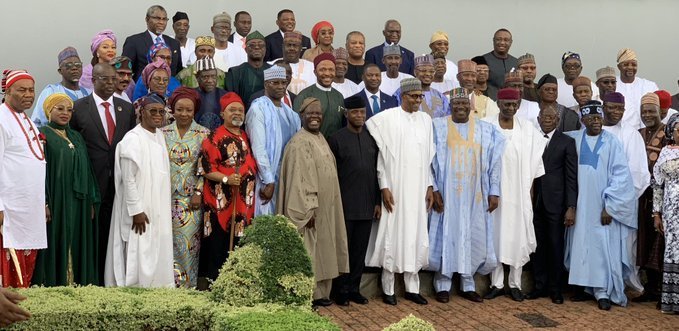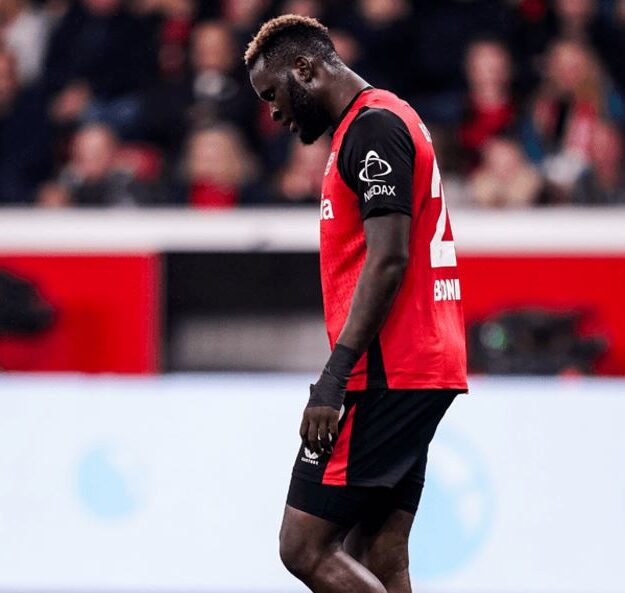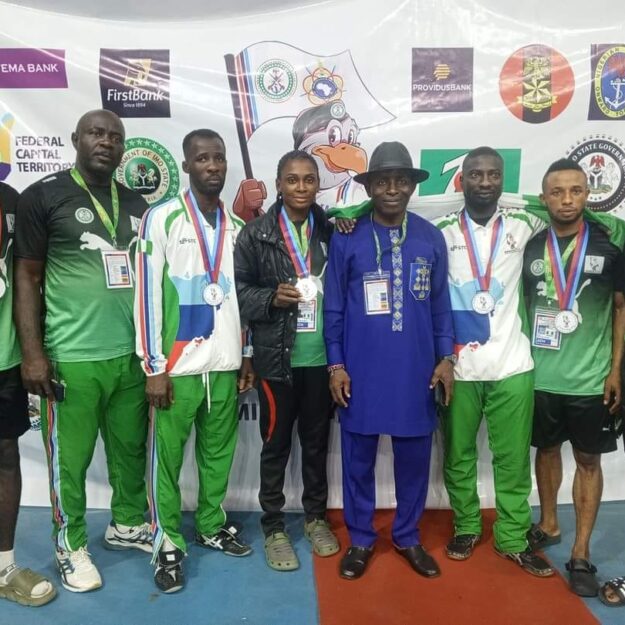
Buhari and his ministers
Mr Buhari, who was returned as president in a keenly contested election, was sworn in for his second tenure on May 29.
In appointing his new cabinet in July, the president retained Babatunde Fashola, Chris Ngige and 12 others who served in the old cabinet while 18 others were not reappointed, a PREMIUM TIMES check revealed.
Expectedly, 12 of the 14 ministers from the last cabinet were returned to serve in their previous posts.
The only two returning ministers not retained in their previous positions are Mustapha Baba Shehuri and Osagie Enahire. Mr Shehuri was previously state minister of power, works and housing but now serves as the Minister of State, Agric and Rural Development while Mr Ehanire was made substansive health minister after his stint as state health minister.
Below are 12 ministers returned to serve in their previous portfolios:
1. Ogbonnaya Onu: Elected the first governor of old Abia State in 1991, Ogbonnaya Onu said he would work to be the best minister in Nigeria after he was appointed Minister of Science and Technology in 2015.
Though he had great ideas to promote homegrown technology in all agencies under the ministry, the lack of follow-up and accountability appeared to be a major challenge to progress, an analysis of Mr Onu’s three years in office by PREMIUM TIMES revealed.
He was reappointed in the same ministry, but this time will be assisted by a Minister of State, Mohammed Abdullahi.
2. Adamu Adamu: Before his first appointment as education minister in 2015, Adamu Adamu was a columnist for Media Trust‘s titles and often was syndicated by many news outlets including London-based Crescent International.
He failed to reduce Nigeria’s out of school children despite pledging to reduce the number by half before the end of his tenure.
While Mr Adamu was reappointed as education minister, his state counterpart was replaced with Emeka Nwajiuba.
3. Hadi Sirika: A pilot and a former senator from Katsina State, Hadi Sirika was among appointees asked to “take a bow” and leave by the Senate during the ministerial screening because he was a former lawmaker in both lower and upper chambers.
When he was appointed Minister of Aviation in 2015, Mr Sirika, 55, became known for baring his mind against ownership of private aircraft through corrupt means.
High cases of delayed flights were also recorded. Mr Sirika was scored average in this paper’s analysis of his two years in office.
He was returned as Minister of Aviation.
4. Chibuike Amaechi: Despite several controversies trailing him, Mr Amaechi, a former governor of Rivers State, was also reappointed to serve in the Ministry of Transportation without the ‘aviation’ segment.
He was the Director-General of President Muhammadu Buhari’s re-election campaign organisation.
He was scored average in this medium’s rating of his stewardship in the ministry.
5. Mohammed Bello: This is one minister whose possible return had raised controversy especially among residents of the Federal Capital Territory (FCT).
Abuja gradually became a sharp contrast of its original plan under Mr Bello as FCT minister. His administration seemingly turned a blind eye as infrastructure and public utilities in the city deteriorated.
He was returned as FCT minister, nonetheless. However, a minister of state, Ramatu Tijani, has been assigned to assist him.
6. Babatunde Fashola: A former Lagos State governor was returned as Minister of Works and Housing. However, the power segment of his previous portfolio was removed this time.
President Buhari’s decision to take out the power ministry from Mr Fashola did not come as a surprise to keen observers.
In fact, merging the three important ministries under a ‘super minister’ has proved to be a huge unsuccessful gamble.
His often bloated assessment of the power sector is a sharp contrast to realities on the ground as power supply, arguably, diminished under his watch.
His performance was rated average in a PREMIUM TIMES analysis of his two years in office.
7. Lai Mohammed: He was appointed to head the ministry of information and culture in 2015 and played his role as government mouthpiece quite well.
Mr Mohammed was reappointed information minister.
8. Abubakar Malami: Mr Malami served as the national legal adviser for the defunct Congress for Progressives Change (CPC), a party founded by Mr Buhari in 2010.
CPC was one of the opposition parties which fused into the All Progressives Congress (APC) on which platform Mr Buhari won the presidential election in 2015.
Following his appointment as minister in November 2015, Mr Malami became an officer expected to champion the cause of justice in a government that pledged a war against corruption.
He was nonetheless called back to serve as Nigeria’s justice minister.
9. Chris Ngige: A former governor of Anambra State came back as Minister of Labour and Employment despite his faceoff with several labour unions in his first stint.
Mr Ngige also failed to manage grievances by several workers’ union which resulted in strike actions.
The main labour coalition, NLC, also declared Mr Ngige an enemy of workers and asked President Buhari not to reappoint him.
Mr Ngige’s performance was rated average in this newspapers’ analysis.
10. Geoffrey Onyeama: One of his shortfalls in his first stint was the failure to address the challenges of the country’s diplomatic missions abroad despite promises of reform and rationalisation.
Many of the 110 Nigerian missions and embassies abroad are still a national embarrassment as they still groan under financial difficulties.
Mr Onyeama was rated average in a PREMIUM TIMES analysis of his stewardship.
He was also returned as Minister of Foreign Affairs.
11. Zainab Ahmed: Following the resignation of the past minister of finance, Kemi Adeosun, President Buhari in 2018 appointed Zainab Ahmed to oversee the ministry.
Mrs Ahmed was Nigeria’s Minister of State Budget and National Planning until her appointment.
12. Adamu Suleiman: A former Inspector General of police, Mr Suleiman was reappointed as minister of water resources.
After the announcement of his return to his post on Wednesday, Mr Adamu has already pledged to re-position the ministry’s roadmap, geared toward achieving Sustainable Development Goal (SDGs) six for quality water and sanitation in the country.
***
You may be interested

Premier League: Chelsea Overcome Leicester City Away
Webby - November 23, 2024Chelsea defeated Leicester City 2-1 in their Premier League clash at the King Power Stadium on Saturday.Nicolas Jackson gave Chelsea…
CAFCC: Olanrewaju Explains Enyimba’s Switch To Uyo Grass Pitch Ahead Al-Masry Clash
Webby - November 23, 2024Yemi Olanrewaju, Head Coach of Enyimba, has explained to Completesports.com the rationale behind the team’s relocation to the Godswill Akpabio…

Boniface Can Still Play This Year — Leverkusen Boss Alonso
Webby - November 23, 2024Bayer Leverkusen manager Xabi Alonso remains optimistic Victor Boniface will return to action for the club before the end of…




















![American Pastor, David Wilson Seen Eating The Box Of Woman Who Isn’t His Wife [Video]](https://onlinenigeria.com/wp-content/uploads/2019/10/american-pastor-david-wilson-seen-eating-the-box-of-woman-who-isnt-his-wife-video-150x150.jpg)







